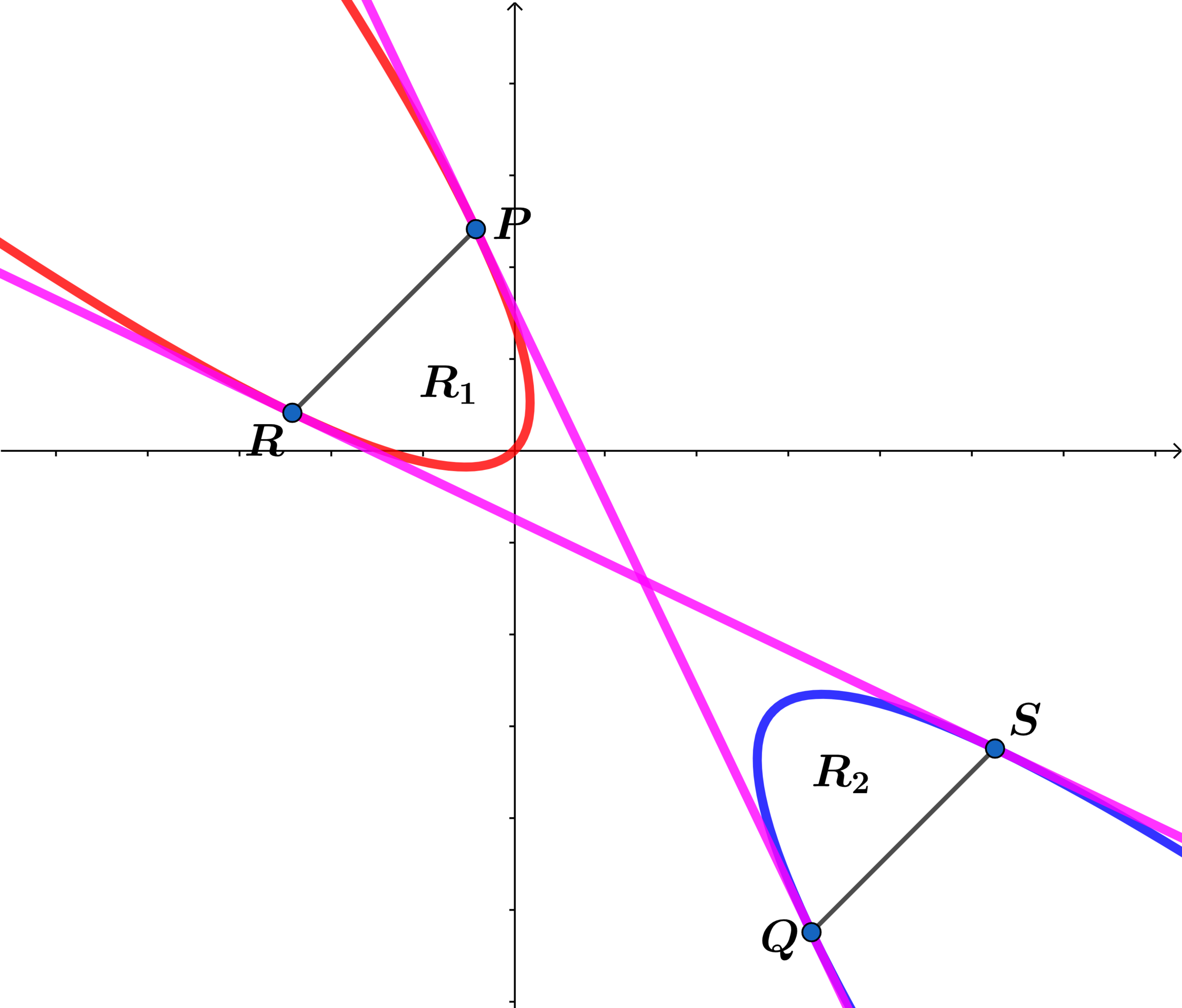All Common Tangents

The parabolas x 2 + 2 x y + y 2 + 2 x − 2 y = 0 and x 2 + 2 x y + y 2 − 2 x + 2 y + 8 = 0 have common tangents at P and Q and R and S .
If the total area A R 1 + R 2 of the regions above can be expressed as A R 1 + R 2 = c a b , where a , b and c are coprime positive integers, find a + b + c .
The answer is 21.
This section requires Javascript.
You are seeing this because something didn't load right. We suggest you, (a) try
refreshing the page, (b) enabling javascript if it is disabled on your browser and,
finally, (c)
loading the
non-javascript version of this page
. We're sorry about the hassle.
Using the equations of rotation for a rotation about the origin ( 0 , 0 ) :
x = x ′ cos ( θ ) − y ′ sin ( θ )
y = x ′ sin ( θ ) + y ′ cos ( θ )
Replacing x and y in x 2 + 2 x y + y 2 + 2 x − 2 y = 0 and finding θ we obtain:
x ′ 2 + y ′ 2 + ( x ′ 2 − y ′ 2 ) sin ( 2 θ ) + 2 cos ( 2 θ ) x ′ y ′ + 2 ( cos ( θ ) − sin ( θ ) ) x ′ − 2 ( sin ( θ ) + cos ( θ ) ) y ′ = 0
Setting x ′ y ′ term to zero we have cos ( 2 θ ) = 0 ⟹ 2 θ = 2 π ⟹ θ = 4 π
⟹ 2 x ′ 2 − 2 y ′ 2 = 0 ⟹ y ′ = x ′ 2 .
In a similar manner replacing x and y in x 2 + 2 x y + y 2 − 2 x + 2 y + 8 = 0 we obtain: y ′ = − x ′ 2 − 4
Let f ( x ′ ) = x ′ 2 and g ( x ′ ) = − x ′ 2 − 4 ⟹ f ′ ( a ) = 2 a = g ′ ( b ) = − 2 b ⟹ a = − b .
Let R : ( − b , b 2 ) and S : ( b , − b 2 − 4 ) ⟹ m R S = − 2 b 2 b 2 + 4 = − 2 b
⟹ 2 b 2 − 4 = 0 ⟹ b = ± 2 .
In the x ′ y ′ system:
For b = 2 ⟹ R : ( − 2 , 2 ) and S : ( 2 , − 6 )
and
For b = − 2 ⟹ P : ( 2 , 2 ) and Q : ( − 2 , − 6 )
For region R 1 : R P = 2 and f ( x ′ ) = x ′ 2
⟹ A R 1 = ∫ − 2 2 ( 2 − x ′ 2 ) d x = ( 2 x ′ − 3 x ′ 3 ) ∣ − 2 2 = 3 8 2 .
For region R 2 : Q S = − 6 and f ( x ′ ) = − x ′ 2 − 4
⟹ A R 1 = ∫ − 2 2 ( 2 − x ′ 2 ) d x = A R 1 = 3 8 2
⟹ A R 1 + R 2 = 3 1 6 2 = c a b ⟹ a + b + c = 2 1